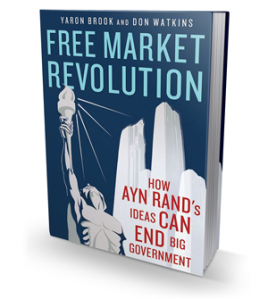 Most American conservatives, today–however “radical” or “extremist” the political Left calls them–do not openly challenge “big government” in the form of Social Security and Medicare. While some seek a complete repeal of the recent ObamaCare legislation, at most, they want to “reform” these other two programs by a scheme of partial privatization.
Most American conservatives, today–however “radical” or “extremist” the political Left calls them–do not openly challenge “big government” in the form of Social Security and Medicare. While some seek a complete repeal of the recent ObamaCare legislation, at most, they want to “reform” these other two programs by a scheme of partial privatization.
Yet, in his recent book, RooseveltCare, Don Watkins demonstrates that the United States grew, prospered, and did quite well at providing for old age for 158 years, before FDR and his fellow “Progressives” pushed Americans into accepting the Social Security program. Watkins also shows that, ultimately, a complete repeal of Social Security is the only moral course of action; any lesser measure, as the ultimate goal, is morally wrong. Social Security is basically an inter-generational Ponzi scheme that is morally bankrupt and does nothing but harm.
RooseveltCare is divided into 2 parts: “The Story of Social Security” and “Social Security: A Verdict.”
The first part is a thorough survey of the history of the United States as it relates to Social Security. The account of the culture of American self-reliance prior to Social Security is inspiring and enjoyable. It includes the plethora of options ordinary people had in dealing with old age and life’s unexpected challenges, both in preparation and response. The account of the rise of Social Security and the welfare state makes clear that these government programs were not something that most Americans considered an obvious necessity, even during the government-created Great Depression. Social Security was pushed by “Progressive” intellectuals, on Americans who had no intellectual defense, (and some operative elements of the un-American morality of self-sacrifice, making them susceptible.)
The second part of RooseveltCare is an exploration of the moral status of Social Security. It takes the arguments of Social Security’s proponents seriously and persuasively shows why they are wrong, (such as that Social Security is an “earned benefit.”) It discusses how and why Social Security is destructive to Americans’ economic and moral well-being. It discusses why “reforms” of the Social Security system are not a morally acceptable endpoint: ultimately, only a complete phase out of the system over a finite number of years will do.
I highly recommend RooseveltCare: How Social Security is Sabotaging the Land of Self-Reliance, by Don Watkins. It contains fascinating history, and will help give most people a stronger appreciation for the benefits of liberty and the culture of self-reliance. Workers in 19th-Century America were not downtrodden and were not starving in the streets. Starting out poor was not considered an indignity, to be “corrected” by handouts, but an honorable condition to be improved by diligent work on one’s own behalf. (A huge number of Americans in fact did improve their lot quite significantly this way.) It was, rather, accepting unearned charity and handouts that were often considered beneath one’s stature as a self-reliant adult.
The “Progressive” movement changed these attitudes and made unnecessary dependency morally acceptable in most American’s eyes. This opened the way for government redistribution, and has led to a host of destructive effects, including the destruction of wealth and the elimination of opportunities for investment in new technologies.
If we Americans want a bright future of prosperity, technology, opportunity and self-esteem for ourselves and our children, we need the majority of the population to understand the moral and economic need to completely phase out government entitlement programs. As a first step, we need as many thoughtful people as possible to read Don Watkins’ book:
RooseveltCare: How Social Security is Sabotaging the Land of Self-Reliance
—–
Related Posts:
19th-Century Capitalism Didn’t Create Poverty, But Reduced It
Why Healthcare in the US is So Expensive, and What Can Be Done About It
Laissez-Faire Capitalism Solves “The Tragedy of the Commons” and Deals With Negative Externalities: A Dialogue
Socialism and Welfare vs. Justice: Why Inalienable Private Property Rights are Required for Justice
America Before The Entitlement State


